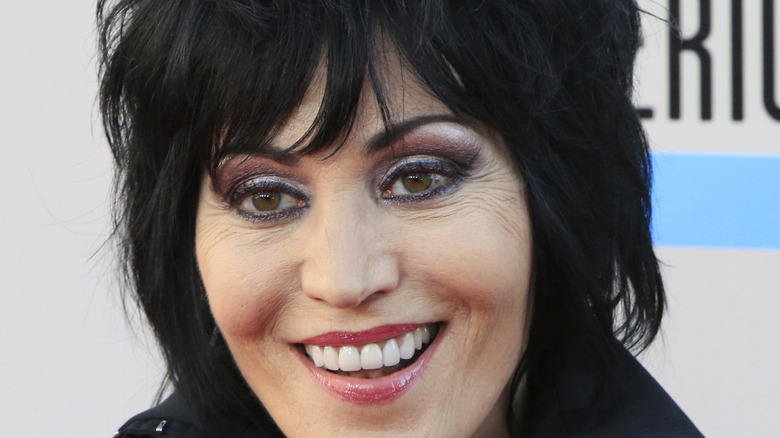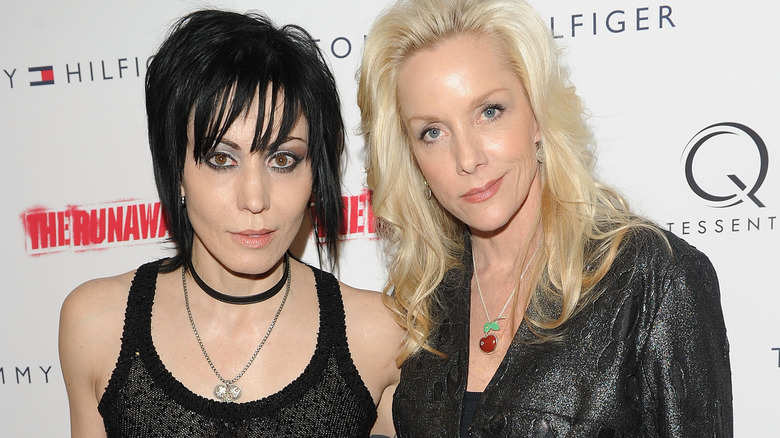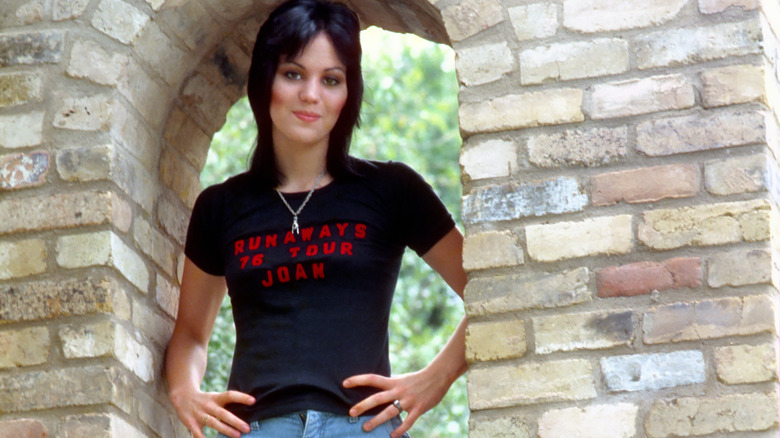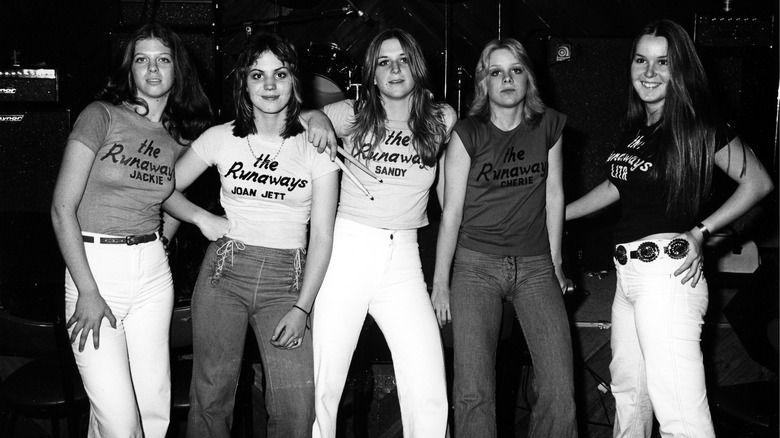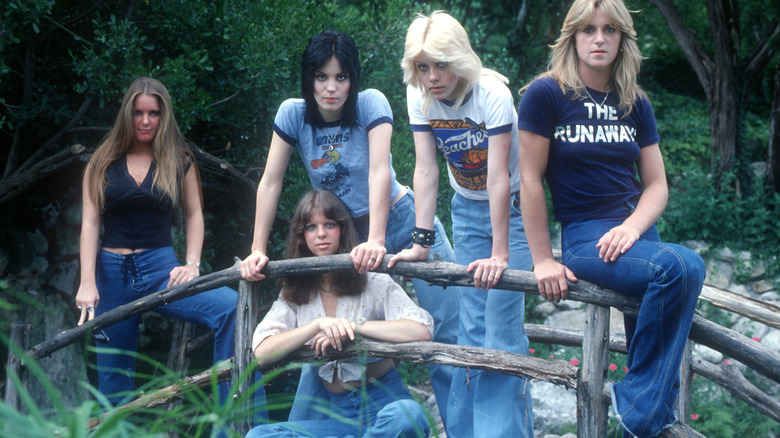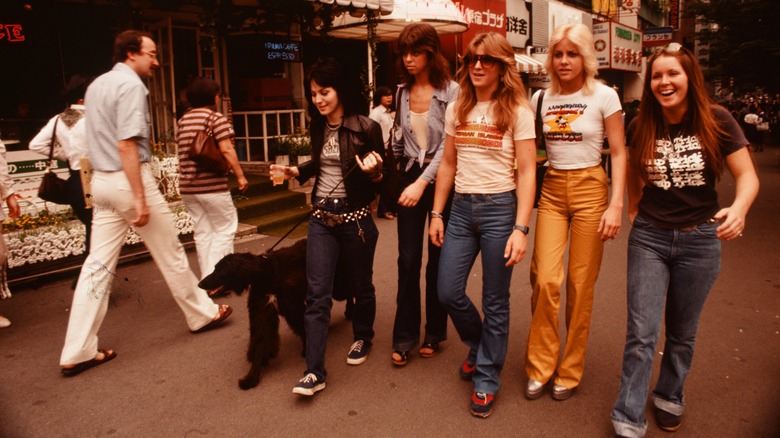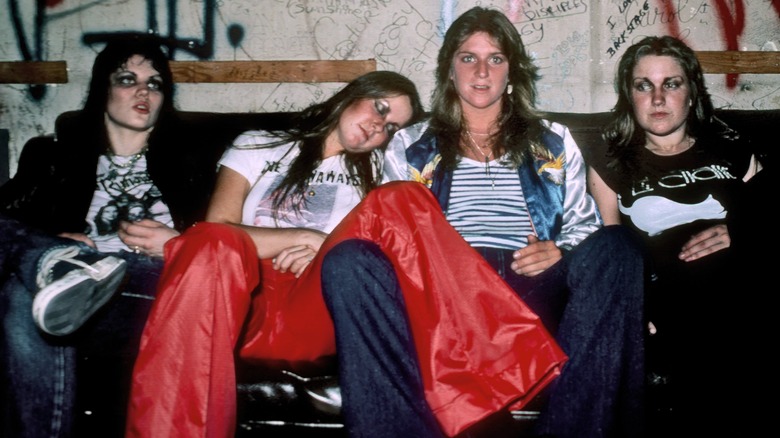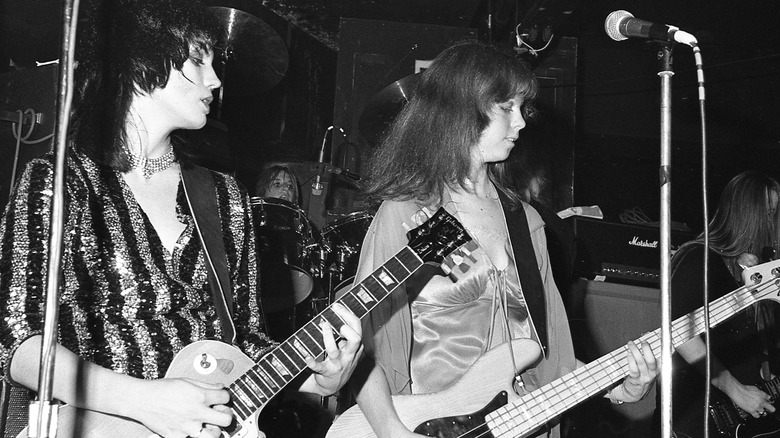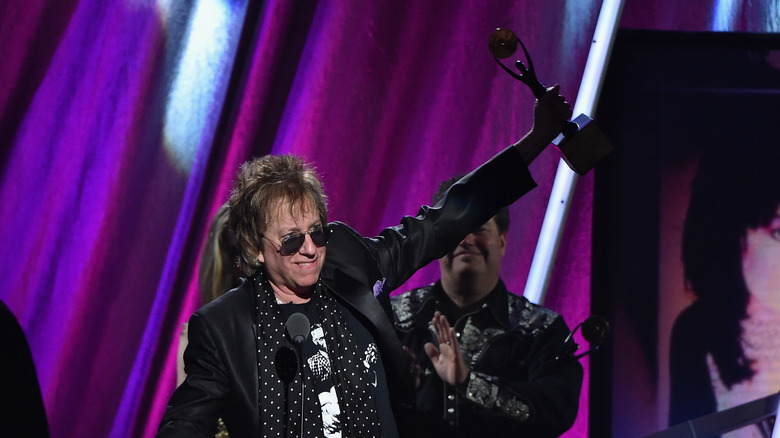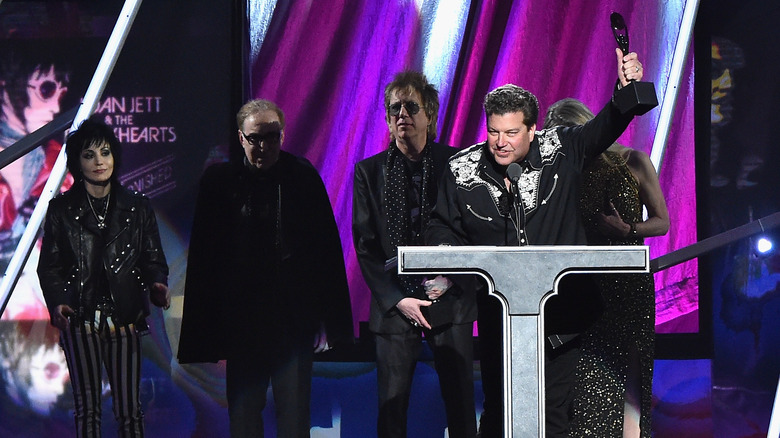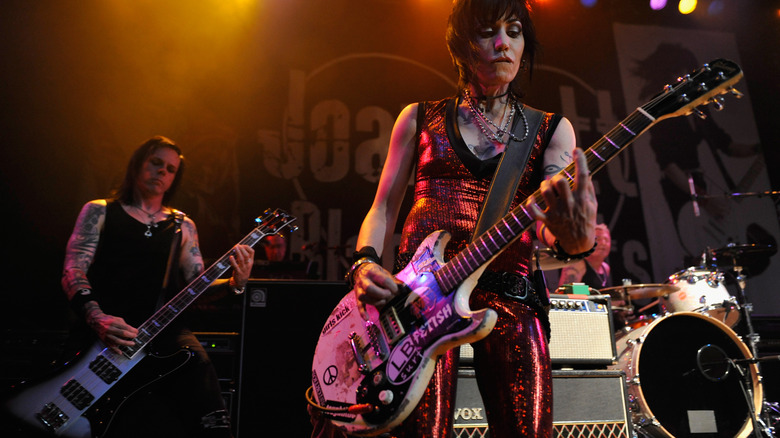What Joan Jett's Former Bandmates Have Said About Her
When Rolling Stone asked Joan Jett if she had voted for Dolly Parton to be inducted into the Rock & Roll Hall of Fame, she gave what they called "a very Joan Jett answer." In other words? She didn't confirm nor deny — she only said that yes, she'd filled out her ballot for that year.
And that's kind of how interviews with her go: When she spoke with The New York Times in 2018, she explained, "It's always uncomfortable for me to assess my place in the world. I'm very shy, in a way." But at the same time, she's been an outspoken advocate for women's rights, particularly in the music industry. She famously wrote "Cherry Bomb" in about 20 minutes for a new bandmate to audition with. But it wasn't just for the new singer. Jett said that with the song, she was "trying to represent all girls." She's lauded her one-time manager for giving the then-teenage Runaways the power to take control of their own sexuality, but in her decades in the spotlight, she's never felt the need to publicly confirm her own. In other words? Jett is a figure who is both incredibly public and very, very private.
For the best glimpse into exactly who this queen of rock and roll is, let's look at her through a different lens: From the point of view of those who worked alongside her, doing what she loves best.
Cherie Currie on meeting Joan Jett
In her book, "Neon Angel: A Memoir of the Runaways," Cherie Currie (right) told the story of being approached in a club and recruited to audition for a band that was being put together by someone who made her feel like maybe it was a setup of some sort. When she saw Joan Jett at the audition that she felt vastly unprepared for, she wrote that Jett already seemed like a seasoned professional, even as a teenager: "It was weird because back at the club, there had been something so shy and withdrawn about her. But, man, when she put that guitar around her neck, you couldn't take your eyes off her. She oozed attitude and charisma. I was very, very intimidated by her and totally drawn to her at the same time."
Currie spoke of their first interactions as though Jett had already climbed a few rungs up the ladder of fame. She was well-known enough that Currie remembered being "starstruck," and predicted that she'd go a long way in the business. But there was something down-to-earth about her, too. Currie recalled shaking her hand for the first time: "She seemed friendly enough, and her presence relaxed me a little."
That intuition proved right on the money. It was at that first audition that Jett and manager Kim Fowley stepped away for a bit and wrote the song that would become one of The Runaways' biggest hits: "Cherry Bomb."
On her early songwriting
It's tempting to think of songwriters and rock stars as larger-than-life, as always having had the confidence to put their own thoughts on paper with the sort of bravery that only happens when someone bares their soul to scores of strangers. That might not always be the case, though.
In 2013, Joan Jett sat down to talk to WNYC Studios. She said that the little over three years that The Runaways were together "was one of the most magical times in my life." She spoke, too, about getting started in music and her early career as a songwriter. It was easier then, she said: "maybe because you were just starting and you were filled up to the top, so it was easier to have things spill out."
Easier, perhaps, but according to Cherie Currie's observations in her memoir, "Neon Angel," Jett wasn't always a confident songwriter. Even as manager Kim Fowley hurled bizarrely creative verbal abuse at the girls on a regular basis, he helped write lyrics — and the then-15-year-old Currie was observant enough to know that he only wanted a piece of the royalties. He got it, Currie wrote, because Jett felt she couldn't do it on her own. "Looking back, it was obvious that Joan didn't need Kim to help her write, but she was as young and insecure as the rest of us, and Kim really made us all feel that we needed him."
Sandy West and Cherie Currie on Jett vs. Ford
In 2000, The Runaways' Sandy West and Cherie Currie sat down for an interview with Backfire, and it was enlightening stuff. Although the band had been wildly popular, they'd also burned very brightly and self-destructed after a run that was, in the grand scheme of things, fairly short. By the time of the interview, rumors of a reunion had been brewing for some time, and it was Lita Ford who had vocally condemned Joan Jett for her apparent unwillingness to put the band back together. West and Currie had different takes on things.
They claimed that Ford had set the reunion up to be a failure, arranging to call Jett to work out the logistics of a potential million-dollar record deal immediately on the heels of Jett getting off an unimaginably long international flight. When an exhausted Jett wasn't feeling the conversation, Ford threw a fit and, Currie said, the whole thing fell through. She continued, explaining that it fell through after that, too, with Ford being the one to refuse... behind the scenes.
"Lita's been lying to people, blaming everything on Joan. Joan's never been the bad guy in this — she's always been the supportive one. There's something wrong with Lita. She's unstable."
Lita Ford, Joan Jett, and a non-existent Runaways reunion
By the time 2018 rolled around, it hadn't gone unnoticed that a 40th anniversary for The Runaways was fast approaching. What better time would there be to bury the hatchet? Unfortunately for fans, Lita Ford (left) made it quite clear that wasn't going to happen and told The Daily Mail that the reason for that was simple: Joan Jett.
Ford was at an event in Las Vegas when she was asked about the potential reunion, and her response didn't leave much room for interpretation. "Joan Jett is very much in Joan Jett Land, I guess you could say. Will she ever come out of Joan Jett Land? I don't think so. I think her manager controls that and it's really up to him and her."
She wasn't finished, either, and claimed that Jett had become so beholden to her longtime manager that he had even joined them at dinner, and that his interference led to her denying the possibility of a reunion. She did hint, though, at the fact that in order for there to be a reunion at all, there were a lot of behind-the-scenes conflicts that would need to be put aside. Still, did she see Jett and her fellow pioneering bandmates as family, despite the conflict? "No. We don't feel that way about each other at all. I don't feel that way about the rest of the girls. ... we're just better off living our separate lives."
When Lita Ford needed her
Lita Ford's memoir, "Living Like a Runaway," doesn't back down from the perhaps inevitable conflict that happened when a group of teenage girls were plucked from obscurity, put on stage, and had a meteoric rise through what was still a male-dominated industry. Although it's clear that she's never been on the best of terms with Joan Jett, she wrote candidly about a terrifying night when she discovered even if they weren't friends, they still had each others' backs.
The Runaways were on tour in Japan, and Ford wrote that it was their final show when she tripped and fell down a flight of stairs. Afterward, she hooked up with a man from Texas who gave her some pills, and when she woke up, she discovered she was hemorrhaging blood. Jett and Cherie Currie went to her room and left when they felt like there was nothing else to be done. The bleeding didn't stop, though, and Ford was rushed to the hospital. She said that she never really found out what had happened, but recalled waking up.
"[I] saw Joan asleep in a chair next to my bed. ... It was weird because Joan and I never really hung out together, but the instant I saw her sitting at my bedside table in the hospital, I felt a tremendous respect for her. The Runaways were never a team, but that said a lot to me."
Vicki Blue had thoughts on Jett's interference in her movie
It was 2004 that saw the release of "Edgeplay: A Film About The Runaways." The documentary featured interviews with members of The Runaways... sans Joan Jett. And here's the weird thing: Although it was written and directed by Victory Tischler-Blue — better known as The Runaways' bassist, Vicki Blue (right) — there was no music from the actual band in the documentary. Why? Jett had refused to sign off on the rights to it.
Tischler-Blue sat down to talk to Ultimate Guitar about the release of the documentary and the challenges that came with filming it. She shared that she had already put together the film that she wanted, piecing together clips of live performances and behind-the-scenes footage to create something that "was all about the spirit of the band, the spirit of five teenage girls realizing their dream." When Jett refused to get on board, Tischler-Blue had to start from scratch.
"It has been really weird and perplexing to everybody," she shared. At the same time she made it clear that she wasn't sure what had happened and was baffled by the fact that Jett had gotten on board with another film that had considerable overlap with hers, she said there was one thing that she absolutely felt comfortable saying on Jett's behalf, and that was a statement regarding the death of drummer Sandy West. "Sandy's heart was pure. She just wanted to play music and that was it really."
Jackie Fox made some serious allegations
Jackie Fox was 15 years old when she met Kim Fowley and was recruited to become a member of The Runaways. That was in 1975, and it took her 40 years to tell a terrible story to the Huffington Post. It was New Year's Eve, they'd just finished a concert, and they kicked off a celebration at a local hotel with a group of teenagers. After being given pills, Fox says she went to lie down: She said that she started drifting in and out of consciousness, and that's when she said that Fowley raped her in front of the room. "I remember opening my eyes, Kim Fowley was raping me, and there were people watching me," she recounted. Among them, she claimed, were Joan Jett and Cherie Currie.
Currie said that she had left the room at that point, but 14-year-old Kari Krome — who also said she, too, had been sexually assaulted by Fowley — claimed she had seen Currie and Jett laughing as it happened.
Jett posted a response on Facebook, saying (in part), "I was not aware of this incident. Obviously Jackie's story is extremely upsetting and although we haven't spoken in decades, I wish her peace and healing." Fox's Facebook response came shortly afterward, saying (in part), "I only wish that if my bandmates can't remember what happened that night — or if they just remember it differently — they would stick to simply saying that."
If you or anyone you know has been a victim of sexual assault, help is available. Visit the Rape, Abuse & Incest National Network website or contact RAINN's National Helpline at 1-800-656-HOPE (4673).
Ricky Byrd on his own music, not getting the spotlight, and growing apart
Ricky Byrd played alongside Joan Jett with The Blackhearts for a decade, starting in 1981. He's played with scores of others as well and told MusicRadar that the only unfortunate thing about his time with The Blackhearts was that Joan Jett overshadowed everyone else... even though she didn't mean to.
Byrd said that she was super open to the rest of the band's suggestions, and even though the media invariably put the spotlight on her, he said that she never acted like she was the one in charge or that hers was the only opinion that mattered. "Joan always felt as if she was one of the Blackhearts," he explained. He stressed that there were no hard feelings leading to his departure and that she hadn't held it against him: "I did bump into her two years ago — we hugged," he shared. He had gotten his own publishing deal, and he'd played the same songs often enough. It wasn't all fun and games, though, and he told Guitar Player that he just couldn't keep up with the grueling pace she set. Between touring and recording, he'd had enough.
But, he stresses, not in a bad way. That's him playing guitar on the most iconic version of "I Love Rock 'n' Roll," and he says, "I walk into a store and I hear that song. It's like, how blessed am I? ... It doesn't get cooler than that."
Gary Ryan: Called back from the quiet life
Given the young age that Joan Jett was when she got her start on stage, it's fitting that one of the first members of The Blackhearts was just 15 years old when he started playing alongside her in her new band. That was Gary Moss, who changed his name to Gary Ryan for his time on stage. He told the Pocono Record that he called it quits in 1986, after seven years with the group. Why? The traveling and the touring just got to be too much, so he ended up opting for the quiet life, getting married, and becoming a teacher.
He also said that he never forgot how to play, so when he was inducted into the Rock & Roll Hall of Fame with Jett, he was ready and waiting. Moss had stayed in touch with Jett in the decades since leaving the band and told the Digital Journal that he had nothing but good memories and good things to say about her. "Joan and I were very close and got along very well," he said. "Funny, those first few years were hard work, don't get me wrong, we were living and playing on the road relentlessly. Just being a band. It still never really felt like work to me. But ... what was it like to play with Joan? It was awesome."
Acey Slade on intimidation and Joan Jett's shadow
Acey Slade joined Joan Jett and The Blackhearts later in the game, and in 2015, he stepped away from the band to go solo. Surprising? Yes, and no.
In an interview for Icon vs. Icon, Slade credited Jett with handing him the most impactful experience of his career. He also acknowledged that it was a pretty sweet gig and that it was nice just being able to show up and play. It also opened a ton of doors for him. While he was grateful for that, there was also no denying the fact that Jett was a force to be reckoned with.
He talked to Joe Daly about his decision to leave The Blackhearts and said that while he didn't have anything bad to say about her, he also acknowledged the fact that the group was a deeply personal thing for her. That meant that while there were some outside influences, it was her group at the end of the day. He explained, "I didn't take it personally, as far as her not wanting to use [songs he wrote], because I can understand that. The band's called 'Joan Jett.' I joined 'Joan Jett and The Blackhearts.'" When he announced that he was going to release his own work and found there was a demand for it, he simply decided that while it was great to be a part of her thing, he needed to do his thing.
